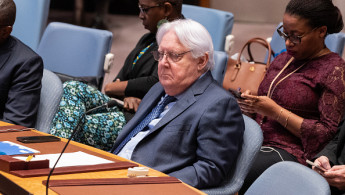The conflict in Sudan is fueling a humanitarian emergency of 'epic proportions,' UN chief says
The conflict in Sudan is fueling “a humanitarian emergency of epic proportions” that threatens the entire country, the U.N. humanitarian chief warned on Friday.
Martin Griffiths also said that the protracted conflict in the African country “could tip the entire region into a humanitarian catastrophe.”
Some places are already out of food, said Griffiths, the U.N. undersecretary-general for humanitarian affairs. He added that hundreds of thousands of Sudanese children are severely malnourished “and at imminent risk of death if left untreated.”
“A long conflict will almost certainly lead to a lost generation of children as millions miss out on education, endure trauma, and bear the physical and psychological scars of war,” he said, and described reports of children being used to fight as “deeply disturbing.”
Sudan was plunged into chaos in mid-April when months of simmering tensions between the military, led by Gen. Abdel Fattah Burhan, and the paramilitary Rapid Support Forces, commanded by Mohammed Hamdan Dagalo, exploded into open fighting in the capital of Khartoum and elsewhere.
The fighting is estimated to have killed at least 4,000 people , according to the U.N. human rights office, though activists and doctors on the ground say the death toll is likely far higher. More than 4.3 million people have been displaced, including some 3.2 million within the country, according to the U.N. refugee agency.
The United Nations and rights groups have accused both the military and the RSF of numerous human rights violations, including sexual violence. The warring parties have rejected the accusations. Last week, 20 U.N. agencies and international organizations called for peace, access to deliver humanitarian aid, and respect for human rights.
Griffiths echoed these calls in a statement and said “the international community needs to respond with the urgency this crisis deserves.”
He said the intense fighting has not only ravaged Khartoum and the western Darfur region but has also spread to South Kordofan and is moving closer to Jazira province, the country’s breadbasket.
In South Kordofan’s capital, Kadugli, food stocks have been completely depleted “as clashes and road blockages prevent aid workers from reaching the hungry,” he said, and in West Kordofan’s capital, al-Fula, “humanitarian offices have been ransacked and supplies looted.”





 Follow the Middle East's top stories in English at The New Arab on Google News
Follow the Middle East's top stories in English at The New Arab on Google News

![MP Essam Diab's pursuit to block TikTok in Egypt has revived an already ongoing debate in the country. [Getty]](/sites/default/files/styles/image_330x185/public/1230748046.jpeg?h=a5f2f23a&itok=-8MqBLLC)
